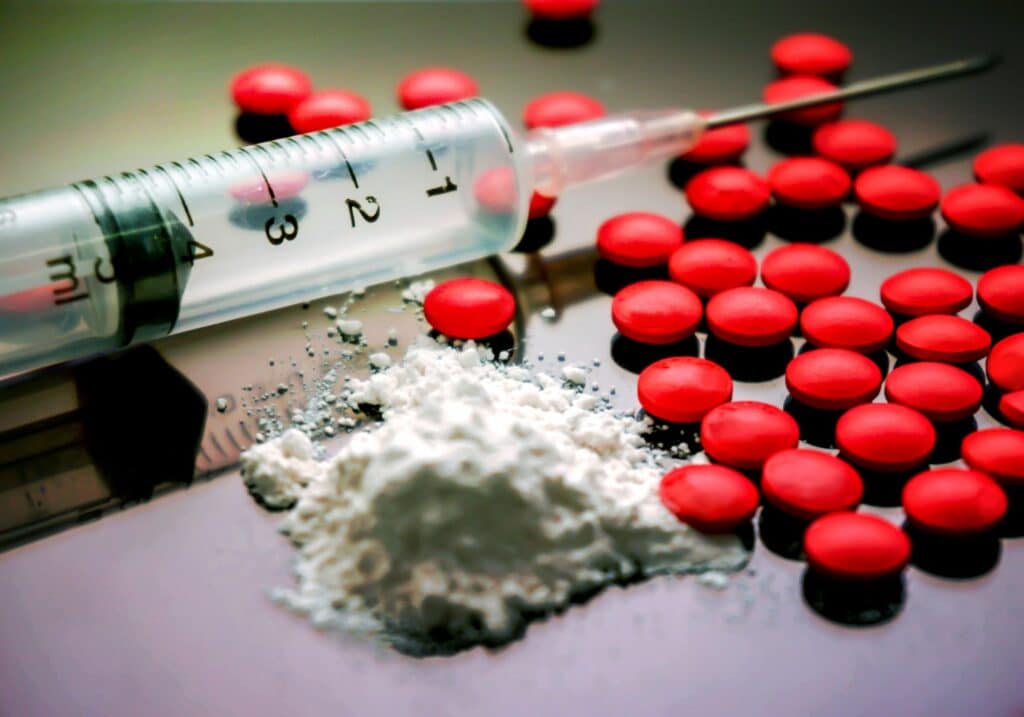Amphetamine abuse is a significant issue impacting our society. Prescription stimulants such as Adderall and Dexedrine, as well as illegal amphetamines like methamphetamine and ecstasy, pose a high risk of addiction and can have disruptive effects when abused recreationally. Gaining an understanding of these substances and their effects on the body is crucial for recognizing addiction signs and seeking appropriate help for this complex problem.
What are Amphetamines?
Amphetamines, commonly known as ‘speed’, are a class of stimulants that impact the central nervous system (CNS). They are known for boosting alertness and have legitimate medical uses, including the treatment of attention deficit hyperactivity disorder (ADHD) and narcolepsy, a condition that affects sleep.
Often dubbed ‘smart drugs’ or ‘club drugs’, amphetamines have found a following among the youth, who may view them as more accessible and less harmful than substances like heroin. However, this misconception belies the potentially severe consequences of amphetamine addiction, which can wreak havoc on health and various facets of life just as profoundly as more notorious drugs.
What is Amphetamine Addiction?
Amphetamines are man-made stimulant drugs designed to enhance alertness, energy, and focus while reducing appetite. They’re often prescribed for medical conditions like attention-deficit hyperactivity disorder (ADHD), narcolepsy, and obesity, and can be effective when used as directed. However, their use outside medical guidance, especially to elevate mood or improve performance, can quickly lead to addiction. This is partly because the body adapts to amphetamines rapidly, requiring increasingly higher doses to achieve the same euphoric effects. Addressing amphetamine addiction may necessitate a comprehensive detox process to support recovery effectively.
Types of Amphetamine
Amphetamines are a group of stimulant medications used primarily to treat conditions such as ADHD. Among these, several prescription drugs contain amphetamine or its derivatives, including:
Dexedrine contains dextroamphetamine, one of amphetamine’s two primary active ingredients, the other being levoamphetamine, as outlined by the Food and Drug Administration. Dextroamphetamine is considered more potent than its counterpart levoamphetamine and even amphetamine itself. Methamphetamine, another compound structurally similar to amphetamine, is known for its stronger and more euphoric effects, though it is illicit and carries a high risk of addiction and severe harm. Additionally, ecstasy (also referred to as Molly or MDMA) falls into the amphetamine category, offering psychoactive effects that alter the mind.
Causes of Amphetamine Abuse & Addiction
The path to amphetamine misuse and addiction can start in various ways. For some, it begins with a prescription from a doctor to address specific health concerns, while others might turn to these substances in an effort to self-medicate personal troubles or out of simple curiosity. Addiction’s roots are complex and often stem from a mix of factors, including:
Genetic Influences
The likelihood of developing addiction can be higher for those with family members who have faced substance abuse challenges. Research suggests a genetic component could be at play, particularly among immediate family members.
Brain Chemistry
Abnormalities in brain structure and function might fuel amphetamine addiction. Theories suggest that individuals with naturally lower dopamine levels may seek the high from amphetamines to compensate for their lack of euphoria. Variations in brain anatomy have also been observed in those prone to addiction.
Environmental Factors
Growing up in environments marked by stress, unhappiness, or where drug misuse is normalized can increase the risk of addiction. Exposure to such settings can influence individuals to view drug use as acceptable or a coping mechanism.
Psychological Reasons
There’s a belief that many turn to amphetamines as a way to self-medicate underlying mental health issues. Continuous amphetamine use disrupts the brain’s dopamine balance, leading to a dependency on the drug for feeling pleasure.
Understanding these contributing factors can be the first step toward addressing amphetamine abuse and seeking effective treatment.
Signs and Symptoms of Amphetamine Addiction
Given that amphetamines can be prescribed, it’s common for individuals to overlook the potential for addiction these potent stimulants hold. They accelerate heart rate, can cause a surge in blood pressure, and lead to rapid breathing. The intense euphoria they induce often prompts users to consume more to maintain the sensation.
The following are key signs of an amphetamine addiction:
Physical Indicators:
- Persistent dry mouth and associated dental issues
- Elevated body temperature
- Heightened blood pressure
- Experiencing headaches
- Abdominal discomfort
- Signs of undernutrition
- Vision impairment
- Increased rate of breathing
- Enlarged pupils
Behavioral Signs:
- Manifestations of depression
- Confusion
- Paranoia
- Experiencing delusions
- Aggressive behavior
- Fluctuating moods
- Difficulty sleeping
- Hallucinations
- Decreased interest in eating
Recognizing these signs can be the first step toward seeking help and recovery for oneself or a loved one grappling with amphetamine addiction.
Effects of Amphetamine Addiction
Amphetamine addiction can have profound and detrimental impacts on an individual’s life. The repercussions of amphetamine misuse extend far beyond health, affecting personal and professional aspects of life. Some of the consequences associated with amphetamine abuse include:
- Severe weight loss and nutritional deficiencies
- Challenges in maintaining performance at work or in educational settings
- Deterioration of relationships with family and close associates
- Intense and irrational suspicion or distrust
- Exacerbation of existing mental health conditions
- Reduced emotional wellness
- Cardiovascular problems, including chest discomfort and potential heart failure
- Neurological issues, such as convulsions and seizures
- Emotional distress, including deepening depression
- Development of amphetamine-induced psychotic symptoms
- Risk of entering a coma
- The ultimate risk of death
These severe outcomes underscore the critical need for addressing amphetamine addiction promptly and effectively.
The Impacts of Amphetamine Addiction
Amphetamine addiction can deeply and adversely impact every facet of your life, including your personal relationships, career, and both your physical and mental health. You might struggle with maintaining focus and managing your everyday tasks and obligations.
The influence of amphetamines on the brain is profound, as they disrupt the natural balance of neurotransmitters, particularly the one responsible for inhibiting brain activity. This leads to increased dopamine levels, which fuel the desire to re-experience the drug’s euphoric effects. Research indicates that prolonged amphetamine use can even lead to a reduction in brain volume.
These significant changes in brain chemistry and structure due to amphetamine addiction can irreversibly impair cognitive functions, alter behavior, and detrimentally affect an individual’s overall health and well-being.
Amphetamine Abuse vs. Amphetamine Addiction
There’s a distinct difference between amphetamine abuse and addiction, though one often leads to the other. Abuse refers to the improper use of amphetamines, such as taking doses higher than prescribed or using the drug for non-medical reasons. This misuse is an initial step that can pave the way to addiction.
Addiction is characterized by a compulsive need to consume amphetamines, regardless of the negative impact it may have on one’s life. Many individuals might start by inadvertently abusing amphetamines, perhaps by increasing their dosage to recapture the drug’s initial effects without realizing the potential for harm. This escalation can quickly result in developing a tolerance and dependence on the drug, where abuse may evolve into full-blown addiction.
Dangers of Abusing Amphetamines
Abusing amphetamines, beyond their addictive nature, poses significant health risks, especially when used recreationally. These risks encompass:
- Increased likelihood of engaging in risky behaviors, potentially leading to injury.
- Serious cardiovascular complications, such as strokes, heart attacks, and heart failure.
- Significant weight loss and nutritional deficiencies.
- Disturbances in sleep patterns.
One of the critical concerns with amphetamine abuse is the potential for long-term brain damage. Research published in the Annals of the New York Academy of Sciences highlights that amphetamines can cause the loss of brain gray matter and damage to dopamine receptors. These changes can alter brain function significantly, complicating efforts to cease drug use and increasing the risk of relapse.
Amphetamine Withdrawal
Ending amphetamine use after extended periods can be daunting due to the drug’s addictive properties and the discomfort associated with withdrawal. Many find that overcoming these hurdles necessitates expert intervention. Withdrawal unveils the toll amphetamines have taken on the body, manifesting in symptoms such as:
- Depression
- Anxiety
- Profound tiredness
- Flu symptoms
- Intense desires for the drug
- Thoughts of self-harm
These withdrawal effects underscore the importance of seeking professional guidance to safely and effectively navigate the journey to recovery.
Amphetamine Addiction Treatment in Chattanooga, TN
Navigating through amphetamine addiction requires a comprehensive understanding of its signs, effects, and available treatments. Recognizing the early indicators of addiction, comprehending its consequences on one’s health and daily life, and exploring treatment pathways are crucial steps towards reclaiming control and embarking on a path to recovery.
If you or someone close to you is battling amphetamine addiction, it’s essential to seek expert assistance to begin the healing process and move towards a hopeful future.
At Iris Wellness Group, we prioritize identifying the most suitable treatment strategies tailored to each individual’s unique situation and requirements. We provide various effective treatments for amphetamine addiction in Chattanooga, TN, ensuring a supportive and safe environment for recovery. Call us today or fill out our online contact form to discover how we can assist you or your loved one in finding the right treatment solution.










